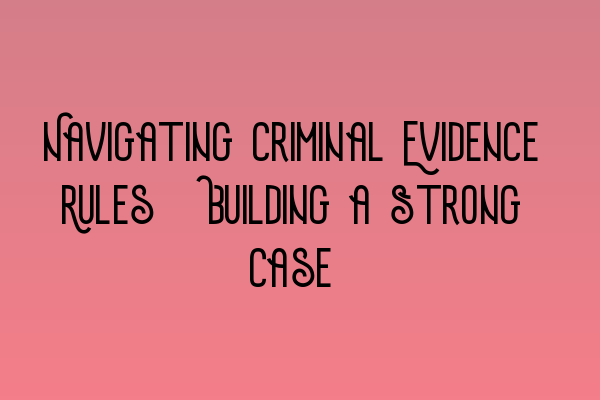Navigating Criminal Evidence Rules: Building a Strong Case
Welcome to SQE Criminal Law & Practice Law UK! As experts in criminal law, we understand the importance of building a strong case for your clients. One crucial aspect of a successful defense or prosecution strategy is navigating criminal evidence rules effectively. In this blog post, we will guide you through the key steps to building a strong case by understanding and applying the rules of criminal evidence.
Understanding Criminal Evidence Rules
Criminal evidence rules serve as a framework for the admissibility and exclusion of evidence in criminal proceedings. These rules aim to ensure fairness, reliability, and transparency during trials. As a solicitor, comprehending these rules is essential to protect your client’s rights and construct a robust case.
From the initial investigation to the courtroom presentation, evidence must be handled carefully and ethically. Whether you are a defense solicitor or a prosecutor, you need to be familiar with the rules surrounding:
- Relevance and materiality of evidence
- Hearsay evidence and exceptions
- Character evidence and its admissibility
- The use of expert witnesses
- The admissibility of documentary evidence
By understanding these rules and their nuances, you can effectively assess the strength and weakness of the evidence presented in a case.
Building a Strong Case: Practical Tips
1. Thoroughly Analyze the Case
Before delving into the evidence, it is crucial to analyze the case thoroughly. Identify the key legal issues, elements of the offense, and potential defenses. This analysis will help you determine what evidence is indispensable and what can be challenged based on the applicable rules.
2. Collect, Preserve, and Organize Evidence
Collecting and preserving evidence is crucial for building a strong case. Make sure you gather all relevant documents, physical evidence, and witness statements required to support your client’s position. Organize the evidence meticulously, making it easily accessible for review and presentation during trial.
3. Scrutinize the Admissibility of Evidence
Before introducing evidence during trial, analyze its admissibility based on the relevant rules. Ensure that the evidence is relevant, material, obtained lawfully, and does not fall under any exceptions or exclusions. This scrutiny will prevent surprises or objections from opposing counsel and strengthen your case.
4. Utilize Expert Witnesses
Expert witnesses can significantly enhance the strength of your case. Engage with reputable experts who can provide opinions and explanations on technical or specialized subjects related to your case. Ensure that their expertise is relevant and reliable to maintain credibility in the courtroom.
Stay Informed with SQE Criminal Law & Practice Law UK
At SQE Criminal Law & Practice Law UK, we are committed to keeping you up-to-date with the latest developments in criminal law and practice. Stay informed and boost your knowledge by exploring our related articles:
By regularly updating your legal knowledge, you can navigate the complex world of criminal evidence rules with confidence, building strong cases that stand up in court.
For more information, guidance, or assistance, please contact SQE Criminal Law & Practice Law UK. Our experienced team of solicitors is passionate about supporting legal professionals like you in achieving success.
